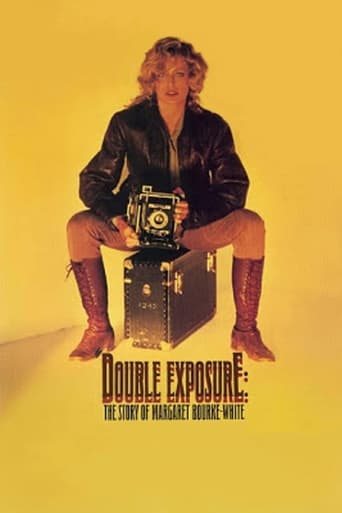secondtake
Double-Exposure (1989)There is no one who thinks this is a good movie, I'm sure not even Frederick Forrest who comes off the best of the main cast as the writer Erskine Caldwell. Certainly Vicki Goldberg must cringe at the way the subject of her well known biography came across--that of Caldwell's lover and wife, Margaret Bourke-White.It's usually the other way around, these days--Caldwell is Bourke-White's husband--for the simple reason that Bourke-White was a courageous, brilliant, visually astute photographer. She had a fascinating career, and a long one, and the book and the movie both try to get to the big points one way or another. And both, in fact, fail pretty well in part because it's so sprawling a task. Bourke-White, the 1920s industrial photographer segues into a concerned documentarian in the 1930s (producing a famed book with Caldwell in 1937), and then covering the rise of Hitler in Czechoslovakia, the bombing of Moscow, and the liberation of concentrations camps in WWII. Then she worked work way into Gandhi's private world, photographed black miners in South Africa, and did a whole slew of other notable assignments for Life Magazine (including the first cover in 1936).The movie is a straight bio-pic in structure, mostly set in a long flashback after opening on the battlefield in WWII. What kills it is director Lawrence Schiller's notion of Bourke-White as a bombshell, turning not only endless scenes into male gossips about her, but also making use of Farrah Fawcett's worst side--her willingness to be a bland pinup. Well, that might work on a dormroom wall, but it's a problem dramatically. To her credit, she does rise above at times, and does assert her strength as a professional actress, but too often she lets the skirt fall to one side when taking a shot, or she gets out of jeep and pauses and fixes her hair as if the whole world is looking.Maybe it is. Bourke-White no doubt used her charm to get places. What's more interesting is her relationship with Caldwell, and Forrest brings out the best of Fawcett. They have a mature and modern relationship, with the twist that he is frustrated by her professional zeal. The movie ends abruptly with a narrator suddenly coming in and telling us what happened after 1945. It's almost like they ran out of money and said, "It's in the can!" But what about her Gandhi work, and what happened with her and Caldwell, now that most of the movie has been about the two of them? Odd goings on.Schiller is a bio-pic kind of director, and he's far too straight forward and uninspiring for this kind of material. This is made for TV stuff and it feels like it. Tread elsewhere unless you just need to know some of the Bourke-White history fast.
genedurham
This movie is indeed a wonderful movie. We had to watch this film in a Journalism Class. I wasn't expecting much from it, but oh how I was wrong to expect so little from this great movie! Farrah Fawcett is excellent in her portrayal of the woman photojournalist Margaret Bourke-White. This is a very well done movie. If you are given the chance to watch this movie, don't pass it up! You will be truly entertained from beginning to end!

